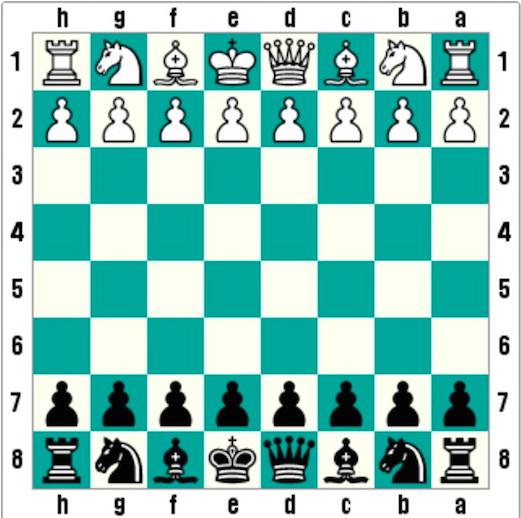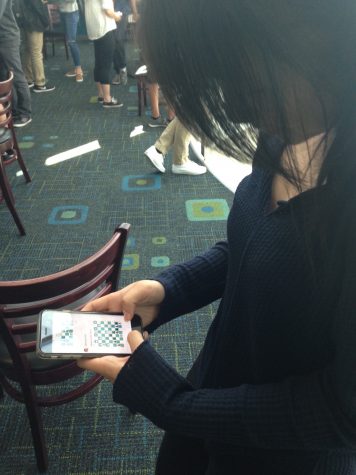Facebook Chess is the next move in social media

An example of the Facebook Chess chessboard. Facebook Messenger users can use a command to start a game of chess with a friend.
May 17, 2016
At a quiet table in Manzanita, two students sit opposite each other, completely focused on an eight-by-eight checkerboard. After a pause, one student directs her king to capture the rook of her opponent, who throws his hands up in frustration. From the hallways of Main to upstairs Dobbins, students can be seen contemplating strategies and trying to discern their opponents’ next move. However, instead of using the traditional wooden chessboard and pieces, these students are utilizing a feature of Facebook Messenger to challenge friends and classmates to a game of chess.
In order to start a game of chess, a Facebook user can type the command “@fbchess play” in a conversation with a friend, causing a chessboard to appear in the chat window. Other commands can be used to move and promote pieces, undo moves, call draws and quit games. After each turn, the modified board is displayed, along with a message prompting the next user to make a move. Throughout the game, the two players can chat.
The feature was first discovered by a Reddit user in December of 2015, who posted it on the site. Ever since, many others have used Facebook Chess as a convenient way to play a game while communicating with friends.
“I first heard about it when one of my friends started a game with me. I was confused at first, but he explained the rules to me, and I started playing,” Gene Wang (9) said. “It’s addicting, and it’s a lot of fun.”

Although some Facebook Chess players routinely use Facebook Messenger to communicate, others prefer other forms of social media to catch up with friends and restrict their Facebook use to chess games.
“Even though I don’t really know how to play chess, it’s fun to think of strategies and beat your friends,” Stephanie Xiao (9) said. “I think my Facebook use has increased to some degree since I started playing, but I usually use other forms of social media like Instagram and Snapchat.”
Some students believe that this feature encourages interest in chess, despite not using the feature themselves.
“I think it’s good that [Facebook chess] is encouraging interest in chess because I think Harker needs more programs that encourage chess. I really don’t see anything wrong with it, and I like the fact that people are so interested in playing chess,” competitive chess player Michael Wang (9) said.
Other members of Harker’s competitive chess team agreed as well.
“There’s a lot of specialized software that people play [chess] on, but the fact that it’s now on Facebook makes it more accessible for a lot of people,” competitive chess player Vignesh Panchanatham (10) said. “I’m not sure if onboard chess will become more popular, but online chess will definitely see an uptake.”
However, some users of the feature do not think that Facebook Chess will have an impact on the popularity of chess.
“People who like chess are going to play it, but people who wouldn’t play chess anyways aren’t going to start playing chess because of Facebook,” Facebook Chess player Misha Tseitlin (11) said.
For those who are less enthusiastic about chess, Facebook Messenger offers other entertaining features. Typing the command “@dailycute” in a chat will cause a picture of a cute animal to appear, and sending the basketball emoji through the Messenger app can start a game of basketball.


















![“[Building nerf blasters] became this outlet of creativity for me that hasn't been matched by anything else. The process [of] making a build complete to your desire is such a painstakingly difficult process, but I've had to learn from [the skills needed from] soldering to proper painting. There's so many different options for everything, if you think about it, it exists. The best part is [that] if it doesn't exist, you can build it yourself," Ishaan Parate said.](https://harkeraquila.com/wp-content/uploads/2022/08/DSC_8149-900x604.jpg)




![“When I came into high school, I was ready to be a follower. But DECA was a game changer for me. It helped me overcome my fear of public speaking, and it's played such a major role in who I've become today. To be able to successfully lead a chapter of 150 students, an officer team and be one of the upperclassmen I once really admired is something I'm [really] proud of,” Anvitha Tummala ('21) said.](https://harkeraquila.com/wp-content/uploads/2021/07/Screen-Shot-2021-07-25-at-9.50.05-AM-900x594.png)







![“I think getting up in the morning and having a sense of purpose [is exciting]. I think without a certain amount of drive, life is kind of obsolete and mundane, and I think having that every single day is what makes each day unique and kind of makes life exciting,” Neymika Jain (12) said.](https://harkeraquila.com/wp-content/uploads/2017/06/Screen-Shot-2017-06-03-at-4.54.16-PM.png)








![“My slogan is ‘slow feet, don’t eat, and I’m hungry.’ You need to run fast to get where you are–you aren't going to get those championships if you aren't fast,” Angel Cervantes (12) said. “I want to do well in school on my tests and in track and win championships for my team. I live by that, [and] I can do that anywhere: in the classroom or on the field.”](https://harkeraquila.com/wp-content/uploads/2018/06/DSC5146-900x601.jpg)
![“[Volleyball has] taught me how to fall correctly, and another thing it taught is that you don’t have to be the best at something to be good at it. If you just hit the ball in a smart way, then it still scores points and you’re good at it. You could be a background player and still make a much bigger impact on the team than you would think,” Anya Gert (’20) said.](https://harkeraquila.com/wp-content/uploads/2020/06/AnnaGert_JinTuan_HoHPhotoEdited-600x900.jpeg)

![“I'm not nearly there yet, but [my confidence has] definitely been getting better since I was pretty shy and timid coming into Harker my freshman year. I know that there's a lot of people that are really confident in what they do, and I really admire them. Everyone's so driven and that has really pushed me to kind of try to find my own place in high school and be more confident,” Alyssa Huang (’20) said.](https://harkeraquila.com/wp-content/uploads/2020/06/AlyssaHuang_EmilyChen_HoHPhoto-900x749.jpeg)





